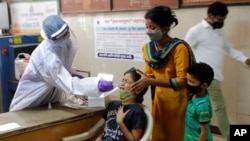ດ້ວຍຄວາມສິ້ນຫວັງ ແລະເສົ້າໃຈ ທີ່ຄອບງໍາອິນເດຍ ໃນຂະນະທີ່ດິ້ນລົນຊອກ ຫາອອກ
ຊີເຈນ ຕຽງນອນຢູໃນໂຮງໝໍ ແລະຢາວັກຊີນ ຍັງສືບຕໍ່ຂາດເຂີນຢູ່ໃນ ລະບົບການປິ່ນ
ປົວຂອງປະເທດທີ່ແຕກແຫງພາຍໃຕ້ຄື້ນຟອງທີສອງຂອງການ ແຜ່ລະບາດໄວຣັສໂຄໂຣ
ນາຢ່າງຮ້າຍແຮງ.
ຢູ່ໃນນະຄອນຫຼວງນິວເດລີ ບ່ອນທີ່ໄວຣັສໂຄໂຣນາສາຍພັນໃໝ່ໄດ້ມີການລະ ບາດຫຼາຍ
ນັ້ນໄດ້ຕິດແປດໃສ່ຫຼາຍໆຄອບຄົວ ຊຶ່ງບັນດາສະມາຊິກຄອບຄົວພາ ກັນດິ້ນລົນຊອກຫາ
ຢາປົວເພື່ອມາຊ່ວຍພວກທີ່ເຈັບປ່ວຍໜັກຢູ່ ທີ່ຂາດເຂີນຢູ່ນັ້ນ ແລະຖັງອອກຊີເຈນທີ່ຂຶ້ນ
ລາຄາ ຢູ່ໃນຕະຫຼາດມືດ.
ບັດນີ້ເປັນເມືອງທີ່ກາງຕໍ່ອາໄສຄອບຄົວ ບັນດາໝູ່ເພື່ອນ ແລະສື່ສັງຄົມໃນການ ຊອກຫາ
ທາງເພື່ອໃຫ້ຜ່ານວິກິດການຄວາມຮ້າຍແຮງຕໍ່ສຸຂະພາບ ທີ່ບໍ່ມີມາກ່ອນ. ຄົນພາກັນຢ້ານ
ກົວທີ່ຈະເປີດປ່ອງຢ້ຽມ ແລະປະຕູໃນຄວາມຢ້ານທີ່ຈະຕິດໄວຣັສ ແລະ ການສົ່ງສະການທີ່
ໂດດດ່ຽວ ກຳລັງຈັດຢູ່ບ່ອນເຜົາສົບ ທີ່ປະຕິບັດເຂົ້າສູ່ ຕອນຄໍ່າ ໃນຂະນະທີ່ຈຳນວນການ
ຕາຍ ເພີ້ມຂຶ້ນຢ່າງບໍ່ລົດລະ.
ນາງລີນາ ຣອຍ ອາຍຸ 49 ປີ ສາມີຂອງລາວ ລູກຊາຍ ແລະພໍ່ແມ່ທີ່ເຖົ້າແກ່ ທັງໝົດໄດ້ກວດ
ພົບຕິດໂຄວິດ-19 ອາທິດແລ້ວນີ້. ໃນຂະນະທີ່ສະພາບແມ່ຂອງ ລາວໄດ້ຊຸດໂຊມລົງ ເຂົາ
ເຈົ້າໄດ້ດິ້ນລົນຊອກຫາຕຽງນອນຢູ່ໂຮງໝໍ. ທ່ານໝໍ ຂອງລາວໃນທີ່ສຸດໄດ້ພົບເຫັນບ່ອນ
ນ້ອຍໆແຫ່ງນຶ່ງ ທີ່ຮັກສາຄົນຊະລາຢູ່ນອກ ນະຄອນເດລີ ທີ່ທ່ານຮູ້ຈັກກັບເຈົ້າຂອງ.
ຫຼັງຈາກສອງມື້ທີ່ບໍ່ສາມາດຕິດຕໍ່ກັບບັນດານາຍໝໍເພື່ອປິ່ນປົວແມ່ຂອງລາວ ນາງຣອຍ
ໄດ້ນຳພາໂຕຂອງລາວເອງໄປທີ່ນັ້ນ ເຖິງແມ່ນວ່າມີອຸນຫະພູມສູງ. ນາງບໍ່ສາມາດພົບກັບ
ນາຍໝໍແຊນີ ເພາະວ່າເຂົາເຈົ້າທັງໝົດມີວຽກຫຼາຍໂພດ. ຕໍ່ມາແມ່ຂອງລາວໄດ້ບອກລາວ
ວ່າ ໂຮງໝໍມີຄົນຫຼາຍໂພດ ທີ່ເຮັດໃຫ້ພວກ ນາຍໝໍ ແລະພວກພະຍາບານບໍ່ມີເວລາມາ
ກວດເບິ່ງພວກຄົນປ່ວຍເປັນປະຈຳ.
ຫຼັງຈາກປະສົບການດັ່ງກ່າວ ນາງຣອຍ ໄດ້ຕັດສິນໃຈປິ່ນປົວພໍ່ຂອງລາວອາຍຸ 85 ປີ ຢູ່
ບ້ານ. ຫຼັງຈາກນັ້ນ ນາງໄດ້ເລີ້ມຊອກຫາດ້ວຍຄວາມຍາກລໍາບາກອີກ ເພື່ອຊອກຫາ
ເຮືອນປິ່ນປົວຄົນຊະລາ ຜູ້ທ່ີ່ສາມາດດູແລຮັກສາ ແລະຊອກຫາ ອອກຊີເຈນໃຊ້ຢູ່ຍ້ານ.
ໝູ່ຂອງລາວນາງຊູຮາຊີນີ ຊູດ ກ່າວວ່າ “ຂ້າພະເຈົ້າ ໄດ້ໂທຫາ 40 ເທື່ອ ມື້ວານນີ້ ໃນ
ຄວາມພະຍາຍາມຊອກຫາ ແລະຊ່ວຍເຫຼືອ ລາວ. ແຕ່ບໍ່ມີໃຜສາມາດຊ່ວຍຂ້າພະເຈົ້າ
ໄດ້. ນາງໄດ້ຈ່າຍ 1,000 ໂດລາຕໍ່ ອອກຊີເຈນຖັງນຶ່ງ ແຕ່ບໍ່ເປັນທີ່ແນ່ເທື່ອວ່າເວລາໃດ
ຈະມາຮອດ. ຜູ້ຂາຍທີ່ນຳສົ່ງນັ້ນໄດ້ຖາມວ່າ ຖ້າຫາກລາວສາມາດເອົາໃຫ້ແກ່ຄົນອື່ນ
ໄດ້ບໍ່ ຊຶ່ງເປັນຜູ້ທີີ່ຢູ່ ໃນອັນຕະລາຍ ມີຄວາມຕ້ອງການຫຼາຍກ່ອນ
Despair and anguish have gripped India as the desperate search for oxygen, hospital beds and medicine continues unabated, with the country’s health-care system buckling under the deadly second wave of the coronavirus pandemic.
In the capital New Delhi, where a more transmissible coronavirus variant has infected entire families, sick family members are desperately seeking medical help for those more severely ill at home or are frantically racing to locate scarce drugs and oxygen cylinders for which a thriving black market has emerged.
It’s a city that now depends on family, friends and social media to navigate through its worst-ever health crisis. People are scared to even open windows and doors for fear of catching the virus, and lonely funerals are being held at crematoriums that are working into the night as the death toll climbs relentlessly.
49-year-old Leena Roy, her husband, son and elderly parents all tested positive for COVID-19 last week. As her mother’s condition worsened, they joined the desperate search for a hospital bed. Her doctor finally located one in a small nursing home in a Delhi suburb whose owner he knew.
After being unable for two days to contact doctors treating her mother, Roy dragged herself there despite running a high fever. She could not meet with sany doctor, though, because they all were too busy. Her mother later told her the hospital is so overwhelmed that doctors and nurses have no time to make regular rounds of patients.
After the experience, Roy decided to treat her 85-year-old father at home. She then began another difficult hunt — locating a nurse who could administer an intravenous drip and hunting for a home oxygen supply. “I made 40 calls yesterday to try and locate an attendant for her. But nobody could provide me one,” says her friend, Suhasini Sood. “She has paid nearly $ 1,000 for an oxygen concentrator but is not sure when it will arrive. The dealer who was supposed to deliver it asked if he could give it to someone who needed it more critically.”




